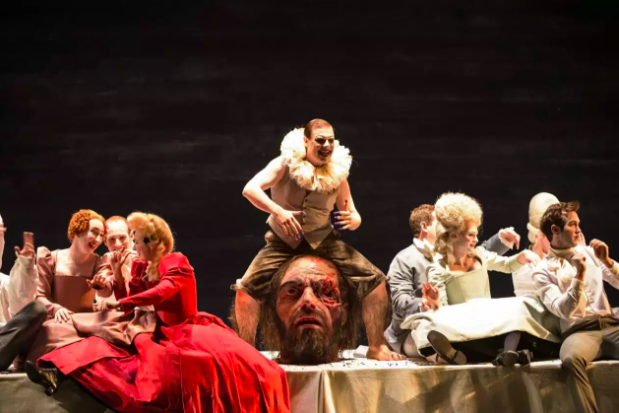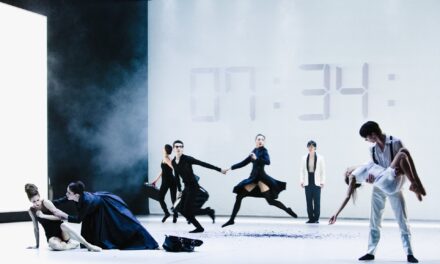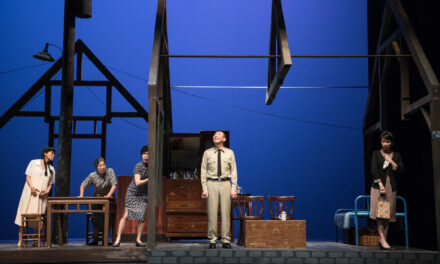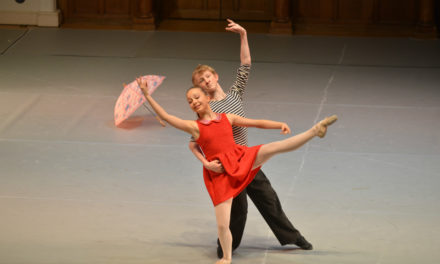“It is easy for opera to be hijacked by the taste police, especially when the taste police have paid £300 for their seats. But opera is not something that’s just meant to delight – a bonbon, a divertissement. That’s such an Anglo-Saxon attitude. For Germans and Russians opera, is woven into their cultural DNA. It’s desperately serious, it’s who they are.”
It will not come as much of a surprise that Barrie Kosky is not someone who cares much about the doilies and finger bowls of cultural good taste. The Australian director thrust his way onto the UK’s opera scene in 2011 with a production of Rameau’s Castor et Pollux for ENO that was more VICE than Versailles – its dominant image a young woman, outstretched on a heap of dirt, being masturbated by hundreds of disembodied human hands.
This is a director who made a “delicious, erotic satyr panto” out of Ovid’s Metamorphoses and whose controversial King Lear was conceived as a blend of “Star Wars with a dash of Nazism and the eerie poetic of William Blake”. Kosky’s productions are giddy and grubby, gorgeous and grotesque, curdled fantasies that rub high culture up against low with provocative friction.
And none more so than Saul, Kosky’s 2015 Glyndebourne debut. In the hands of this 49-year-old, self-styled “gay, Jewish kangaroo”, Handel’s Biblical oratorio became the surprise hit of last summer and has now been released on DVD. A riotous 18th -century fantasy, it is a bit Lindsay Kemp and a bit Peter Greenaway, with a dash of MTV thrown in for good measure. Gory and gothic, it is also a truthful portrait of a mind in collapse.
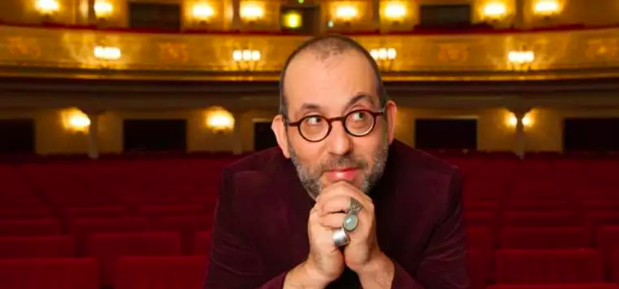
Growing up in Melbourne, Kosky saw an astonishing 200 opera productions by the age of 18
Kosky is no mindless provocateur. There’s nothing more boring in the opera house than a rebel without a cause, and what makes Kosky’s work so dangerous, so disturbing, is its absolute seriousness. The question of what is and is not acceptable to depict on stage is one he has given much thought to, and when conversation turns to last year’s scandal at the Royal Opera House – the persistent booing that interrupted a rape scene in Damiano Michieletto’s production of Guillaume Tell – he’s quick to defend his colleague.
“I think there’s a difference between self-censorship as an artist, and being told what you can and can’t show. To show the rape of a woman in the context of war is perfectly legitimate. If it’s not horrifying what are we doing sitting there watching? That’s when it really does become voyeurism. If an opera like Wozzeck or Lulu isn’t dreadful then it hasn’t worked.”
“Even the great Verdi operas are full of emotional violence and sadomasochism. It’s grown-up stuff; I’m not pitching my shows at 12-year- olds.”
But Kosky himself was hooked on this “grown-up stuff” from an even earlier age. Raised in Melbourne, the son of working-class Jewish emigrants from Eastern Europe, the director saw his first opera (Madama Butterfly) aged just seven, taken by his Hungarian grandmother.
Their opera visits became a regular activity, and by the age of 18 Kosky had seen an astonishing 200 productions. A move into directing was almost inevitable, and after graduating from the University of Melbourne, Kosky took the plunge, quickly establishing himself as the enfant terrible of Australian theatre and opera.
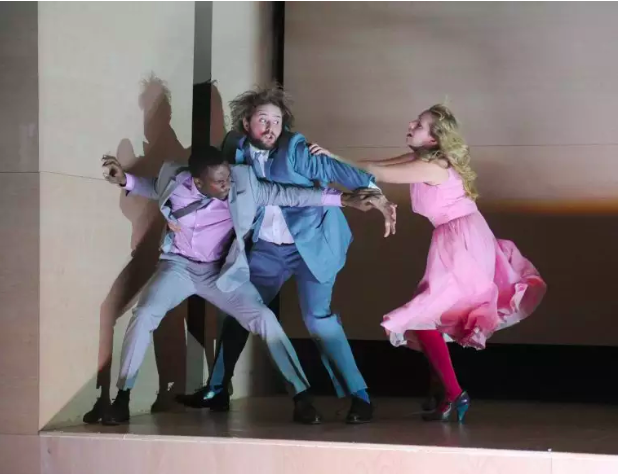
Kosky’s 2011 production of Castor et Pollux at ENO, which saw him thrust his way onto the British opera scene (Alastair Muir)
Currently the intendant of Berlin’s Komische Opera, Kosky makes his Covent Garden debut this autumn with the company’s first ever production of Shostakovich’s The Nose – a deliciously surreal opera about a man who wakes up one morning to find that his nose has disappeared. “When a good production of The Nose finishes you want your audience to be thinking ‘What the hell?’ It’s a work of genius, a strange, late-night roller coaster ride through human paranoia. Nabokov wrote a fantastic essay on the original Gogol short story. He argues that you shouldn’t analyze it as a metaphor for totalitarianism or social anxiety because you’ll destroy it. It’s just a tale about a man who wakes up without his nose – you can read whatever you want into that.”
Written when the composer was just 21, it’s a startling, mature score, unlike anything he ever composed again. “You know it’s Shostakovich when you hear it,” says Kosky, “but the rhythms and structure of the opera are just so psychedelic – he writes it like the dream it is. Musically, it’s as if he took every dance and form he could think of from his box of tricks and just threw it at the score. There’s a constant metamorphosis; just when you think you know where you are it changes again.”
But why has so astonishing a work taken almost a century to arrive at the Royal Opera? “Two reasons. The first is practical – it’s just horrendously complicated and expensive to put on. There are 77 sung roles, and you need a minimum of 33 soloists plus chorus.
“The second is that it really is a very weird piece. Gogol is a sort of Hieronymus Bosch figure in literature – a prophetic voice speaking out decades before Freud, alienation, or the dystopia of the modern city.”
Anyone attending Kosky’s production hoping for Bosch-style horror will, however, be disappointed. “There is one nightmarish scene in which a man is seduced by a nose, but otherwise I’ve just treated it as half-circus, half-vaudeville; there are 10 tap-dancing noses in it for goodness sake. It’s like a very grotty panto – a panto that smells of herring.”
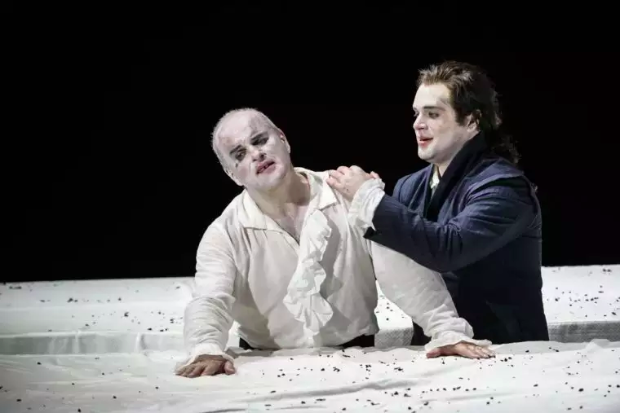
Christopher Purves as Saul and Paul Appleby as Jonathan in Saul at Glyndebourne
Whether it’s tap-dancing noses or something altogether darker, you’re always guaranteed spectacle in a Kosky show. But if it’s this visual excess that makes headlines, it’s the psychology that makes him converts. There were grumblings from more conservative quarters when Kosky was announced as the director of Saul, but what emerged was no vacant shock-show, but a production of Shakespearean scope that was revived immediately on tour.
“When people say that Handel’s oratorios shouldn’t be staged it drives me mad. They are so full of theatre and drama, that you can’t for one moment tell me he wasn’t seeing pictures in his head. The themes are so much bigger than the operas; there are no sub-plots, just huge arcs of drama.”
At the center of this particular arc is Saul, the patriarch losing his grip both on his kingdom and his sanity, desperate to cling to both. He sings surprisingly little, but in the hands of Kosky and the baritone, Christopher Purves, becomes an intimate portrait of human fragility. “I didn’t realize beforehand what we were going to do with this show. With Saul, we kept finding new things every day. I could see Chris thinking, so I pushed him further and further, and by the time we got to opening night he said: ‘It’s Lear’. I always knew it was going to be some version of that story, but without Chris, it wouldn’t have been the same.”
“There’s this popular idea that directors direct in order to showcase their egos, to air their dirty laundry on stage and provoke a helpless audience, but that’s simply not the case. I direct opera so I can work with performers like Chris – fantastic singing actors. It’s that simple.”
But of course, it never is that simple, especially when it comes to opera. More expensive than theatre, more complicated to stage, harder to sell: just what is it that keeps Kosky coming back? “When it’s great it’s the greatest thing ever. There’s this phenomenal thing of watching a human body in the space in front of you producing those sounds just with muscle and bone and air. It’s shamanistic.”
“If we want to get new audiences into the opera house we shouldn’t just be talking about color and movement. They have to understand the basic alchemy of the genre: no microphone, no amplification. Why has opera survived so long? Not because it’s an elitist indulgence, but because it’s something fundamentally human – the primal rendered into music.”
The Nose is at the Royal Opera House from 20 Oct to 9 Nov. Saul is available now on DVD (Opus Arte)
This post originally appeared on iNews on August 1, 2016, and has been reposted with permission.
This post was written by the author in their personal capacity.The opinions expressed in this article are the author’s own and do not reflect the view of The Theatre Times, their staff or collaborators.
This post was written by Alexandra Coghlan.
The views expressed here belong to the author and do not necessarily reflect our views and opinions.

